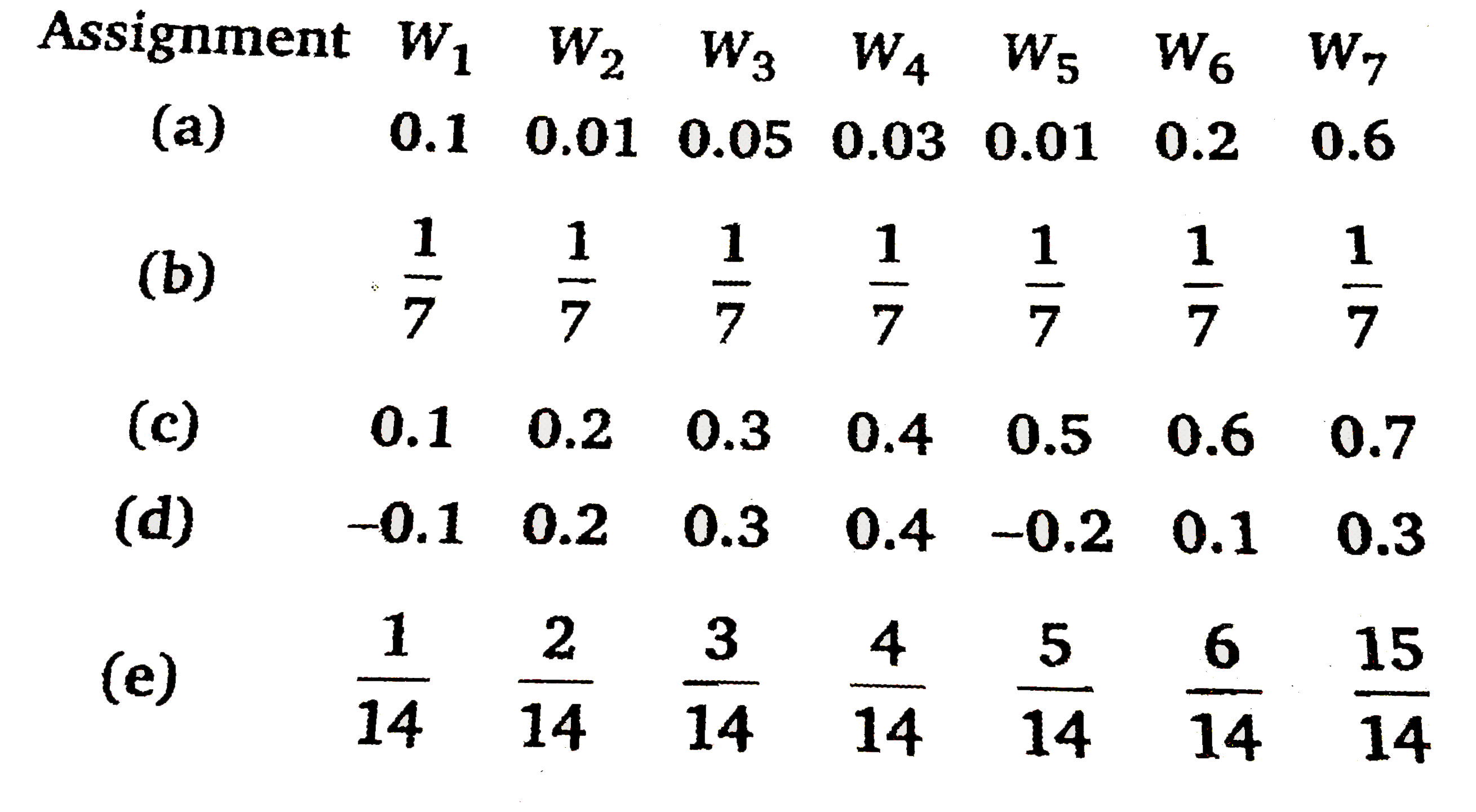Let A,B,C be three events. If the probability of occurring exactly one event out of AandBis1−x, out ofBandCis1−2x, out ofCandAis1−x, and that of occuring three events simultaneously is x2 , then prove that the probability that atleast one out of A, B, C will occur is greaer than 1/2 .Solution in Tamil
P(exactly one event out of A and B occurs)
=P[(A∩B')∪(A'∩B)]
=P(A∪B)−P(A∩B)
= P(A)+P(B)−2P(A∩B)
∴P(A)+P(B)−2P(A∩B)=1−a(1)
Similarly,
P(B)+P(C)−2P(B∩C)=1−2a(2)
P(C)+P(A)−2P(C∩A)=1−a(3)
P(A∩B∩C)=a2(4)
Now,
P(A∪B∪C)=P(A)+P(B)+P(C)−P(A∩B)−P(B∩C)−P(C∩A)+P(A∩B∩C)
=12[P(A)+P(B)−2P(B∩C)+P(B)+P(C)−2P(B∩C)+P(C)+P(A)−2P(C∩A)]+P(A∩B∩C)
=12[1−a+1−2a+1−a]+a2 [Using Eqs. (1), (2), (3), and (4)]
=32−2a+a2
=12+(a−1)2>12 (∵a≠1)
Topper's Solved these Questions
- PROBABILITY I BOOK - CENGAGECHAPTER - PROBABILITY I EXERCISE - Solved Example
1 Videos
- PROBABILITY I BOOK - CENGAGECHAPTER - PROBABILITY I EXERCISE - Exercise 9.1
6 Videos
- PROBABILITY AND STATISTICSBOOK - CENGAGECHAPTER - PROBABILITY AND STATISTICSEXERCISE - Question Bank
24 Videos
- PROBABILITY IIBOOK - CENGAGECHAPTER - PROBABILITY IIEXERCISE - JEE Advanced Previous Year
25 Videos
Similar Questions
There are two bags each containing 10 books all having different titles but of the same size. A student draws out books from the first bag as well as from the second bag. Find the probability that the different between the books drawn from the two bags does not exceed 2.
View SolutionWhich of the following cannot be valid assignment of probabilities for outcomes of sample space S={W1,W2,W3,W4,W5,W6,W7}

View SolutionIf two events A and B are such that P(Al)=0.3, P(B)=0.4 and P(A∩Bl)=0.5, then P(BA∪Bl) equals
View SolutionA signal which can be green or red with probability 45and15 respectively, is received by station A and then and 3 transmitted to station B. The probability of each station receiving the signal correctly is 34 If the signal received at station B is green, then the probability that the original signal was green is (a) 35 (b) 67 (c) 2023 (d) 920
View SolutionLet A ,B ,C be three events. If the probability of occurring exactly one event out of A and B is 1−x, out of B and C is 1−2x, out of C and A is 1−x and that of occurring three events simultaneously is x2 , then prove that the probability that at least one out of A, B, C will occur is greater than 1/2 .
View SolutionFor three events A, B and C, P (Exactly one of A or B occurs)
= P (Exactly one of B or C occurs)
= P (Exactly one of C or A occurs) = 14 and
P(All the three events occurs simultaneously = 116.
Then the probability that at least one of the events occurs, is :
View SolutionLet A ,B ,C be three events. If the probability of occurring exactly one event out of A and B is 1−x, out of B and C is 1−2x, out of C and A is 1−x and that of occurring three events simultaneously is x2 , then prove that the probability that at least one out of A, B, C will occur is greater than 1/2 .
View SolutionFor the three events A,B,and C,P (exactly one of the events AorB occurs)=P (exactly one of the two evens BorC )=P (exactly one of the events CorA occurs)=p and P (all the three events occur simultaneously)=p2 where 0<p<12. Then the probability of at least one of the three events A,Band C occurring is
View SolutionFor three events A,B and C,P (Exactly one of A or B occurs) =P (Exactly one of B or C occurs) =P (Exactly one of C or A occurs) =14 and P (All the three events occur simultaneously) =116. Then the probability that at least one of the events occurs, is :
View SolutionLet A ,B ,C be three events. If the probability of occurring exactly one event out of A and B is 1−x, out of B and C is 1−2x, out of C and A is 1−x and that of occurring three events simultaneously is x2 , then prove that the probability that at least one out of A, B, C will occur is greater than 1/2 .
View SolutionLet A ,B ,C be three events. If the probability of occurring exactly one event out of A and B is 1−x, out of B and C is 1−2x, out of C and A is 1−x and that of occurring three events simultaneously is x2 , then prove that the probability that at least one out of A, B, C will occur is greater than 1/2 .
View SolutionLet A, B, C be three events. If the probability of exactly one event of A and B is 1 - x, out of B and C is 1 - 2x and out of A and C is 1 - x. The probability that the three events occur simultaneously is x2 then prove that the probability that atleast one out of A, B, C will occur is greater than 12.
View SolutionFor three events A,B and C,P (Exactly one of A or B occurs) =P (Exactly one of B or C occurs) =P (Exactly one of C or A occurs) =14 and P (All the three events occur simultaneously) =116. Then the probability that at least one of the events occurs, is :
View SolutionLet A,B,C be three events. If the probability of occurring exactly one event out of AandB is 1−x, out of BandC is 1−2x, out of CandA is 1−x, and that of occuring three events simultaneously is x2 , then prove that the probability that atleast one out of A, B, C will occur is greater than 1/2 .
View SolutionFor three events A,B and C,P (Exactly one of A or B occurs) =P (Exactly one of B or C occurs) =P (Exactly one of C or A occurs) =14 and P (All the three events occur simultaneously) =116. Then the probability that at least one of the events occurs, is :
View Solution
